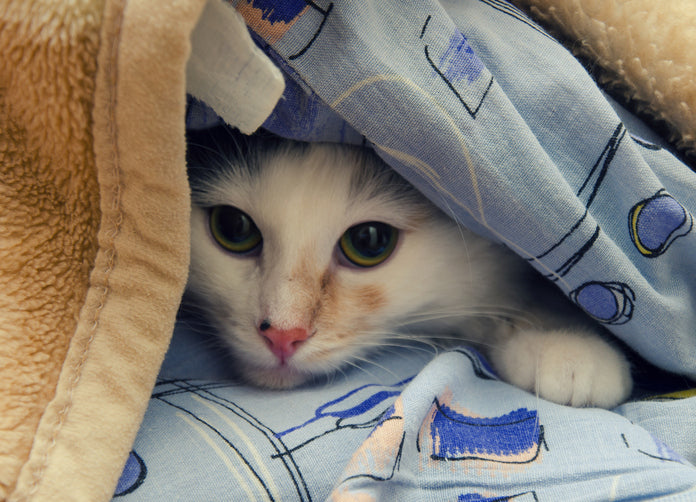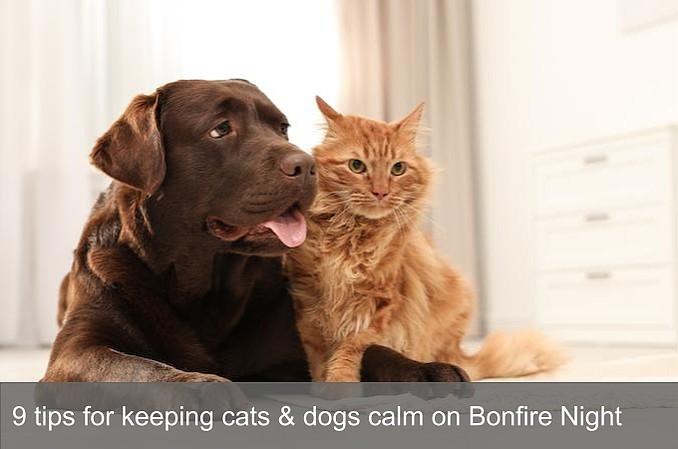Bonfire night is a popular and long-established tradition in the UK. It’s the perfect excuse to get the sparklers out, and watch some extravagant firework shows while wrapped up in cosy layers to stay warm. However it isn’t all fun and games for everybody, least of all for anxious pets.
The loud noises and bright flashes of light can be distressing for your beloved animals, especially as they have no idea what’s going on. For those of you who dread this time of the year, we’ve compiled a list of helpful tips for you to keep your pets calm and help them to survive bonfire night.
Create a safe space

Image source: Ray Bond/Shutterstock
Make sure your cat or dog has somewhere to hide. It’s natural for animals to find somewhere dark to hide when they’re afraid of something. For a few weeks before bonfire night, you can create a haven for your dog with blankets and some of their favourite toys. Try to play with them in here so they feel confident that it’s a safe space they feel they can hide in when things get scary. If they prefer to hide under some furniture, try giving them an old unwashed jumper so they can smell you and feel comforted. As for taking care of cats, they tend to be more solitary animals than dogs and might want to be left alone. If your cat likes to hide in cupboards, leave them to it - this hidey hole is where they feel safe. If your pets are hiding in their safe space, don’t try to coax them out - this can make them feel more stressed.
Secure your home and garden

Don’t assume your garden is secure - if your petrified pet manages to escape into the garden, they can easily runaway and get lost. A few days before Bonfire Night, check all fence panels for any holes or gaps for pets to escape through, and repair or replace as necessary. To make sure your pets can find their way back to you, microchip them with your up to date address and contact details.
If you do need to go out at some point in the evening, make sure you keep your dog in a separate room before opening the front door. For cats, you’ll want to make sure that you close all your windows and cat flap to ensure that they don’t make a break for it in a panic. While it’s not compulsory by law to have cats microchipped, it might be worth taking a look into this to make sure your friendly feline can be reunited with you in the unfortunate case that they manage to get outside.
Minimise light and sound

Image: Christine Bird/Shutterstock
Closing curtains or drawing blinds can ensure that bright flashes of light don’t distress your beloved pets. Turning on the radio or TV can help to cover the noise of fireworks to help ease their discomfort.
Go for an earlier walk

Image: LUM3N on Unsplash
If your dog gets anxious around the time of fireworks, try to take them for a walk much earlier in the day so as to avoid taking them outside in the evening. The walk should help to relax them, and hopefully reduce the stress they’ll encounter.
Don’t chastise them
If your pet is scared, one of the worst things you can do is to tell them off for their behaviour. Remember, they don’t know what those scary flashes and noises are, and are just telling you that they’re afraid. Instead, try to reward calm behaviour so that they feel assured that there’s nothing to worry about.
Keep them company

Image source: Prystai/Shutterstock
If you know that your pets are uncomfortable with fireworks, try to stay home with them so they feel comforted by your presence. If you are unable to stay with your pets, ask a trusted friend who your cat or dog is comfortable with if they wouldn’t mind sitting in with them until you get back. Be aware that your pets may be destructive in your absence, so try not to chastise them if you come home to find chaos they’ve created.
Acclimatise them to loud noises
A few weeks before bonfire night, you could try to desensitise them to the loud noises by playing a noise CD in the background - or failing that, anything by Metallica! At first, introduce this at a very low volume and interact with your pet in a positive way such as with their favourite toys to show them they have nothing to worry about. Over time this should get them used to the loud noises, and hopefully they won’t be as distressed. However if your pet is severely noise phobic, it might distress them more. In this situation, it is entirely up to you whether you think your pet will be able to handle a little noise or not.
See a vet
If your beloved pet’s behaviour still worries you, take them to see a vet for their expert advice. Your vet can recommend a good animal behaviourist to try to get to the bottom of their anxiety, or even prescribe some sedatives for a severely anxious animal.
Keep them calm

Image: sweasy/Shutterstock
If you want to avoid using sedatives with your pets, you could try to use some over the counter remedies. Around two weeks before bonfire night, plug in some dog or cat appeasing pheromones to keep them calm. You can also spray their safety den with the pheromone to keep them calmer on the night of the fireworks. Make sure to keep their water bowl topped up, as the more anxious they are, the thirstier they’ll get. Alternatively, a pet anxiety vest, otherwise known as a Thundershirt, could help to keep your dog or cat calm.
Bonfire night can be extremely stressful for both anxious pets and their owners! Providing a calm atmosphere inside your home is the best way to combat any problems. The overall best way to tackle the situation is to show them they’ve got nothing to worry about, and distract them with their favourite things. Hopefully you’ll find some or all of these tips useful in helping to keep your cherished pets calm!
Lead image: New Africa




